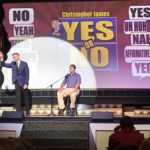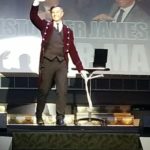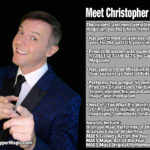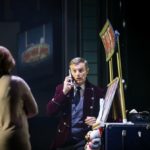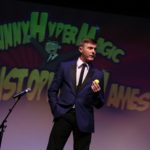By Michael Cignoli
BRANSON, Missouri — As passengers take their seats for a dinner cruise aboard the Showboat Branson Belle, the lights dim and upbeat music begins. A voiceover track introduces Christopher James, the show’s emcee, and he strolls onstage and begins firing up the crowd for their voyage.
James goes through his traditional opening routine, the same one he’ll perform at least 400 times every year, dividing the 1890s-style paddle wheeler into the “port” and “un-import” sides and letting guests know what to expect during their two-and-a-half-hour adventure on the lake.
As he rattles off the need-to-know facts about the boat and funny quips, James makes a card appear from midair. And then, as if nothing just happened, he continues with his opening lines.
Soon, passengers begin eating their three-course meal. Later, they’ll head to the ship’s decks and enjoy panoramic views of Table Rock Lake. Then, to top it off, they’ll be treated to a star-studded, 60-minute variety show featuring hits made famous by Elvis, The Eagles and more.
The quick card trick is such a small part of James’ act, which itself is only a part of the Showboat experience, it might seem insignificant. But it might be the most unbelievable part of the show.
“Nobody notices it,” James laughs. “It’s funny, because that took years to learn how to do.”
‘I LITERALLY HAD NOTHING’
James grew up just outside the old steel town of Youngstown, Ohio, and secured a scholarship to Youngstown State University to study psychology and anthropology. When he went to enroll for his sophomore year, however, he discovered that his scholarship funds were no longer available.
“I had to figure something out,” James said.
With no other way to fund his education, James enlisted in the Navy with the goal of becoming a nuclear engineer. He deferred his entry for a year, allowing him to load up on math classes that would help him in his Navy training. Psychology and anthropology were now a thing of the past.
“If I was going to go into the Navy, I was going to make it a career,” James said. “I had two friends who went in the previous year and they loved it.”
Over the next year, James sold his possessions in anticipation of his cross-country move. Just a few weeks before he was set to begin training, he volunteered to help teach a children’s martial arts class. A freak accident occurred, causing a catastrophic injury that paralyzed his left arm.
James was rushed to a nearby hospital, where doctors surgically repaired his arm. As he lay in bed recovering, still unable to move his arm, a naval recruiter entered James’ room. But instead of bringing the young recruit flowers or a get-well-soon card, he brought discharge papers.
To James’ horror, his time in the Navy was over before it began. And there was no backup plan.
“I couldn’t do anything,” James recalled. “I couldn’t work anymore. I was left with so many bills over this bad accident. I literally had nothing. I had sold everything, because I was getting out of there. I was starting a whole new life. It was awful.”
ROAD TO RECOVERY
As James learned more about his injury, the outlook became bleaker and bleaker. Apart from breaking bones, he also suffered damages to his nerves, muscles and tendons. Doctors feared the effects would be irreversible, and were not sure if he would be able to regain any use of his arm.
But as he sat alone in the hospital, he thought back to childhood visits to his grandmother’s house, where James and his siblings would frequently play card games to pass the time.
“She didn’t have any toys,” James chuckled. “We would make up little magic tricks.”
He began remembering some of those illusions, and spent his spare time reading his old books on sleight-of-hand magic. As he began physical therapy, going through arduous exercises to try to restore mobility, he spent hours trying to manipulate objects like he did when he was a child.
“I didn’t have a lot of support,” James said. “I was there by myself pretty much all the time. I was just trying to find something to do. I had coins there and I started messing with them.”
The illusions that were once so simple were now painstakingly difficult. James spent weeks essentially willing his fingers, thumb and wrist to do even the most basic functions. His hard work paid off and he eventually regained some movement, though nothing close to a full range.
Even today, when he does that sleight-of-hand illusion on stage, he primarily uses his right arm. But the fact that James can move his left arm at all is nothing short of incredible. And the card trick is a callback to his improbable victory, even if the audience does not fully understand that.
“That’s kind of the point of the show,” James said. “I want the magic to be secondary to the people that are on stage.”
STARTING ANEW
Physical therapy may have cemented James’ love for magic, but he didn’t immediately pursue it as his full-time career. His first step was to go back to Youngstown State and finish his degree.
Once he returned to school, a professor gave his class a project to start a theoretical business. James excelled at the project and, on a whim, decided to put aside $500 and start it for real.
James’ business took off and became his primary source of income, and he would spend his free time performing at every venue that would have him – churches, retirement homes, prisons and meetings of his uncle’s biker club. Having the thriving business helped him perfect his routine.
“The nice thing was that’s how I was able to perform at all those different venues,” James said. “I wasn’t worried about the money. I would experiment and try to make my show really different.”
Rather than straight sleight-of-hand tricks or grand stage illusions, he essentially wrote comedy routines and worked magic tricks into his overall act.
“It’s always been my belief that magic should be part of a performance, it should not be the entire performance,” he said. “To me, it’s like being a chef. You sprinkle a little bit of magic here, a little bit of improv there, a little bit of comedy there.”
That recipe was extremely effective.
A friend was training for a competition organized by the Magicians’ Alliance of Eastern States, and invited James along to help him with his act. When they arrived the night before the competition, the friend dropped a bombshell – he had also signed James up to compete.
James went to a 24-hour Walmart and bought some props and stayed up the entire night working on an act. He wound up sweeping every award up for grabs, except for Best Female Performer, winning Magician of the Year, Comedy Act of the Year and Most Original Act.
Things didn’t go quite as well for his friend.
“They even lost his participation certificate,” James laughed. “He was very upset, he wanted to leave immediately. We didn’t even stay for the banquet after the awards.”
ON THE MOVE
James also found himself wanting to leave – not the awards ceremony, but Ohio.
Part of the reason he was interested in the Navy all those years ago was that it would have likely provided him with a chance to explore far-away places. The accident ended that possibility.
Still, he was searching for a change of scenery.
With his act now drawing regional interest, doors started opening for him. He moved to Branson, Missouri, a tourist haven that attracts more than 9 million visitors every year.
The town of about 11,000 in southwest Missouri bills itself as the Live Entertainment Capital of the World, with nearly 50 performance venues and more theater seats than you’ll find on Broadway. He began working for one of those venues, the Showboat Branson Belle, in 2004.
Built to resemble the riverboats that cruised through American waterways in the late 1800s, the boat welcomes hundreds of thousands of visitors every year. Guests have seen a variety of headlining acts in its 23-year history, from talking dogs and aerial violinists to gospel groups and country music acts. But for the past 14 seasons, James has been a constant presence.
The crowds he entertains are as diverse as the show lineup. The vessel is a popular destination for school groups, tour busses and vacationing families from across the United States. It has hosted proms, military reunions – even a gathering of Santa Claus look-alikes.
James has found a way to appeal to all of them.
“I tailor it for the audience that we have,” James said. “When you hear somebody say they’re a comedy magician, that usually means they have a trick that they’ve bought and they add in a few jokes they found on the Internet. I do the opposite.”
He starts with the comedy, developing jokes and props that will play well with a diverse crowd. His book “The World’s Best Clean Jokes” gives you a preliminary idea of what to expect. From there, he pours over classic illusions and decides what will fit in with his newest routine.
And his psychology degree, especially his studies in body language and group dynamics, help him select which audience members are most likely to be natural stars once they take the stage.
“There’s a lot more to my audience selection than it probably looks,” he laughed.
LOOKING BACK, LOOKING AHEAD
The same can be said of James’ card trick early of the show – there is more than meets the eye.
It’s been more than 25 years since James had his life-altering accident, which erased any hopes of his Naval career and led him to this markedly different job on the water. But he is so natural on the stage, it’s difficult to fathom that his life’s ambition was to become a nuclear engineer.
He has become so engrained with this vessel’s identity over 14 seasons, it’s even more difficult to imagine that if not for losing everything, even the movement in his arm, he may likely have spent most of his adult life on a different boat, doing a job not even close to what he does today.
But James has built a career out of developing something from nothing at all. Whether it was finding a way to fund his college education, to rebuilding his life when all was lost, to winning four awards on what was essentially a dare – he’s found a way to engineer himself through.
“I think part of it is that I’m just comfortable doing it,” he said. “When I did the competition, because I hadn’t planned to do it, I didn’t care how it went. I just went out and was me.”
It’s a natural fit, even if the journey to get to this point even was anything but natural.
In a show filled with starpower, with eight other cast members and a four-piece band, James is the No. 1 talked about component of the Showboat on travel review website Trip Advisor. He has more than double the mentions of any other element of the show or dinner cruise experience.
During the two months the Showboat is closed, James brings his act to major cruise lines.
He did the math one day and realized that he spends more of his waking hours on a boat than he does on land. He pokes fun at this during his act, joking that if he were any good at what he does than he’d be working on solid ground. But he’s caught the eye of Hollywood’s Magic Castle, and will soon head to what some consider the Mecca for magicians for the second time in his career.
His acts have changed significantly in the past quarter century – he’s escaped from strait jackets, performed aerial card tricks and this year reinvented a rope trick involving two audience members. He’s particularly proud of this act, which he practiced for seven years before ever debuting it on stage, because of how prominently the audience factors into the performance.
“They look like the stars,” he said. “I like that, I really do. It’s kind of corny, but I like the focus to be on them. If you leave them feeling good, they’re going to come back and see you again.”
